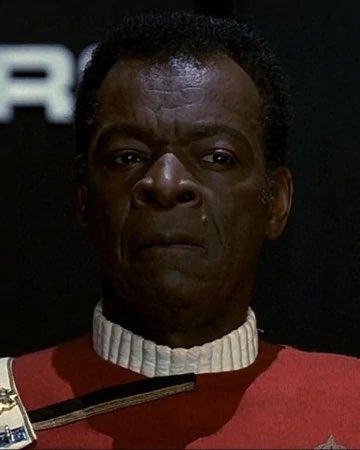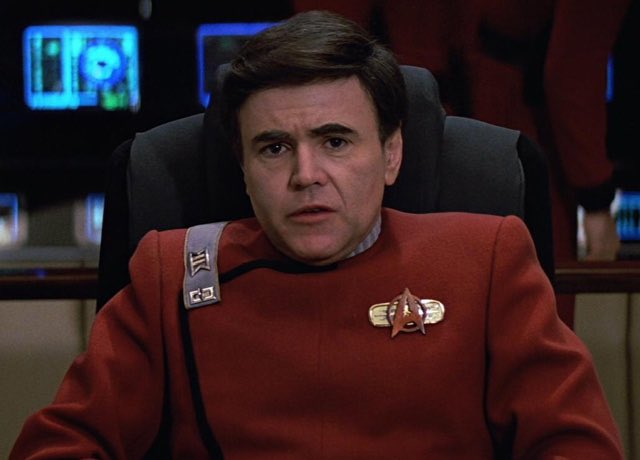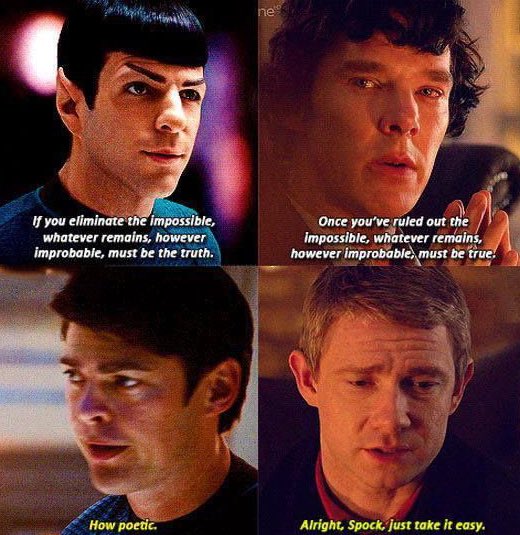#NowWatching “Star Trek VI: The Undiscovered Country.”
It’s as perfect a piece of “Star Trek” as exists.
There will be a podcast coming this week or next week on @thetwofifty’s feed.
It’s as perfect a piece of “Star Trek” as exists.
There will be a podcast coming this week or next week on @thetwofifty’s feed.
I’m obviously not going to live tweet too much about “The Undiscovered Country” now, that’s for later in the week.
But I will pause to note how impossible it would be to make a movie like this today.
The fandom would never accept something so introspective and incisive.
But I will pause to note how impossible it would be to make a movie like this today.
The fandom would never accept something so introspective and incisive.
At the centre of “The Undiscovered Country” is the understanding that your once progressive and well-meaning uncle who likes to tell the occasional “risqué” joke has had his time.
He should probably shuffle off the stage gracefully and let the kids take focus.
He should probably shuffle off the stage gracefully and let the kids take focus.
Fans at the time were outraged at the suggestion that Kirk might possibly be a little bit racist towards the Klingons, evidently never having watched “Errand of Mercy.”
Even the novelisation reads as staggeringly passive aggressive in critiquing the story’s portrayal of Kirk.
Even the novelisation reads as staggeringly passive aggressive in critiquing the story’s portrayal of Kirk.
Again, there’s an obvious point of comparison here, to the “Star Wars” fans who reacted to a similarly nuance and complex portrayal of Luke Skywalker in “The Last Jedi.”
I remember fans being outraged at the treatment of Kirk in “The Undiscovered Country.”
I remember fans being outraged at the treatment of Kirk in “The Undiscovered Country.”
Indeed, “The Undiscovered Country” is fantastic for many reasons, not least of which because it’s a reminder of what major franchises used to be capable of before the angry voices on the internet got to set the conversation.
It’s bold, clever, and genuinely forward-looking.
It’s bold, clever, and genuinely forward-looking.
“Klingons would become the alien trash of the galaxy.”
That’s a line from Admiral Cartwright, played by Brock Peters, who was most famous as Tom Robinson from “To Kill a Mockingbird.”
Think about how bold it is to put that sentiment in the mouth of that actor. It’s brilliant.
That’s a line from Admiral Cartwright, played by Brock Peters, who was most famous as Tom Robinson from “To Kill a Mockingbird.”
Think about how bold it is to put that sentiment in the mouth of that actor. It’s brilliant.
Central to “The Undiscovered Country” is the understanding that Starfleet and the Federation are imperfect.
Utopia doesn’t exist. The goal is simply to keep moving forward, to get better and to improve. There are always new prejudices to overcome and work through.
Utopia doesn’t exist. The goal is simply to keep moving forward, to get better and to improve. There are always new prejudices to overcome and work through.
There’s something prescient in the handling of the crew in “The Undiscovered Country” - in the understanding that yesterday’s progressive heroes occasionally fall behind the times.
(At one point, Chekov directly alludes to “Guess Who’s Coming to Dinner?”, to cement the idea.)
(At one point, Chekov directly alludes to “Guess Who’s Coming to Dinner?”, to cement the idea.)
“The Undiscovered Country” is essentially about grappling with the limits of sixties utopianism, using those signifiers and the franchise itself.
It arrived at a time of a broader reckoning in American pop culture, including, for example, “Forrest Gump.”
It arrived at a time of a broader reckoning in American pop culture, including, for example, “Forrest Gump.”
However, when a lot of that contemporary culture (such as “Forrest Gump”) seemed to be worried that the sixties had gone too far, “The Undiscovered Country” suggested the decade simply hadn’t gone far enough.
It holds a generation’s feet to the fire, and justifiably so.
It holds a generation’s feet to the fire, and justifiably so.
“We come in peace, and you blatantly defile that peace.”
Christopher Plummer is so great in the role of Chang.
He completely understands the movie that he’s in, and also that he’s playing opposite Shatner.
Like Shatner, it’s a big and theatrical performance - enunciation!
Christopher Plummer is so great in the role of Chang.
He completely understands the movie that he’s in, and also that he’s playing opposite Shatner.
Like Shatner, it’s a big and theatrical performance - enunciation!
Chang is probably the second-best big-screen “Star Trek” villain, behind Khan.
This is particularly impressive given how little time Chang spends actually being villainous, as opposed to standing around gnawing scenery.
This is particularly impressive given how little time Chang spends actually being villainous, as opposed to standing around gnawing scenery.
After all, Chang doesn’t even make it to the surface of Khitomer. He spends most of the film’s climax spinning in a chair, quoting Shakespeare.
A Plummer nails it, knowing how to get the absolute most out of the space that he has.
A Plummer nails it, knowing how to get the absolute most out of the space that he has.
“An ancestor of mine maintained that when you eliminate the impossible, whatever remains, however improbable, must be the truth.”
Of course Nicholas Meyer argues that Spock is a descendent of Sherlock Holmes, the great big nerd.
Meyer actually wrote some Sherlock Holmes books.
Of course Nicholas Meyer argues that Spock is a descendent of Sherlock Holmes, the great big nerd.
Meyer actually wrote some Sherlock Holmes books.
Incidentally, if you haven’t seen Meyer’s “The Seven Percent Solution” - adapted from one such book - it is well worth your time.
Sherlock Holmes teams up with Sigmund Freud. It’s delightfully, playfully pulpy - and endearingly sincere in places.
Sherlock Holmes teams up with Sigmund Freud. It’s delightfully, playfully pulpy - and endearingly sincere in places.
More to the point, “The Undiscovered Country” is built around an understanding that it is a fairy tale - that Spock is as fictional as Sherlock Holmes.
“Star Trek” is a fairytale, which is why the film ends with Kirk quoting “Peter Pan.”
“Star Trek” is a fairytale, which is why the film ends with Kirk quoting “Peter Pan.”

 Read on Twitter
Read on Twitter




